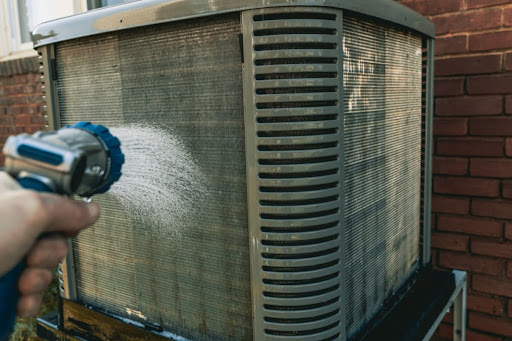
Summer brings its fair share of joys — longer days, backyard barbecues and family vacations. But as the temperatures climb, so does our reliance on air conditioning to keep our homes comfortable. Without proper preparation, your AC might struggle to keep up, leading to discomfort and unexpected expenses. Learning how to prepare your air conditioner for summer can help you avoid breakdowns and keep your home comfortable when it matters most.
To help you stay cool, we've compiled practical tips to get your AC ready for a hot summer.
Start With the Basics: Safety First
Before you roll up your sleeve, make sure the power to your AC unit is turned off. Flip the switch at the circuit breaker, and if your outdoor unit has a disconnect box, turn that off, too. This step keeps you safe while working around electrical components.
Replace or Clean Your Air Filter
One of the most important tips to get your AC ready for a hot summer is to replace the air filter. A dirty filter slows down airflow, makes your air conditioning system work harder and spreads dust around your home. It's generally recommended to clean or replace the filter every one to three months, especially in households with kids, pets or allergies.
For the best results, check your system’s user manual for specific filter recommendations based on your model. If you’re unsure what type of filter you need or how to replace it, don’t hesitate to ask a professional for help.
Replacing the air filter helps your air conditioner work more efficiently and improves indoor air quality. It’s a small task with a big impact.
Clear Debris Around the Outdoor Unit
Your outdoor condenser unit needs breathing room to work properly. Over the months, it tends to collect dirt, leaves and debris. One of the most notable tips to get your AC ready for a hot summer is cleaning the outdoor unit. Grab a soft brush or a vacuum and clear out any gunk stuck around the fins. You can also rinse the unit off with a garden hose (on a gentle setting) to wash away dirt.
Be sure to cut back any plants or weeds that have grown too close to the unit. A two-foot buffer zone around it will help maximize airflow and keep your compressor from overheating.
Clean the Condenser Coils
Over time, your condenser coils can collect dirt and grime, reducing efficiency. After turning off the power, you can rinse the coils with a gentle stream from a garden hose. Avoid using a pressure washer, as it can damage the coils. For a more thorough cleaning, consider scheduling professional maintenance.
Give Your Compressor a Quick Visual Inspection
The compressor is like the heart of your air conditioning system. If it's not working right, your entire setup suffers. Before the weather heats up too much, take a few minutes to inspect the compressor unit outside. Look for signs of wear, strange noises or rusted components.
If your AC struggles to cool the house, the compressor could be under too much pressure or low on refrigerant. Problems like these should be handled by professional HVAC technicians, so don’t wait to request service if anything seems off.
Clear Out the Condensate Drain Line
Your AC pulls humidity out of the air, and that moisture needs to go somewhere. Typically, it drains through a pipe to the outside. Over time, that drainage line can clog with mold, dirt or even algae. When that happens, water backs up — and you could end up with water damage around your air handler.
To clean the drain line, flush it with a cup of white vinegar followed by warm water. If you notice standing water, it could be a sign of a bigger problem, like a broken pump or a blocked pipe. Don’t wait to call in a pro.
Inspect Refrigerant Lines
Check the refrigerant lines running from your outdoor unit to your home for signs of wear or damage. Ensure the insulation is intact to maintain efficiency. If you notice any issues, contact Gillece Services for professional AC repair in Pittsburgh, PA.
Test Your Thermostat
Set your thermostat to cooling mode and lower the temperature to see if the system kicks on. Listen for unusual noises and check if cool air is coming from the vents. If your thermostat is outdated, consider upgrading to a programmable or smart thermostat for better control and energy savings.
Check for Air Leaks
Inspect windows and doors for drafts that can let cool air escape and hot air in. Seal any gaps with weatherstripping or caulk to improve your system's efficiency and keep your home comfortable.
Schedule Professional Maintenance
Even with diligent DIY maintenance, having a professional inspect your system can catch issues you might miss. Technicians can check refrigerant levels, inspect electrical components and confirm that your system runs efficiently.
Upgrade for Efficiency and Better Indoor Air Quality
If your air conditioning system is ten to 15 years old, you might be spending more on energy bills than necessary. Modern systems are built for better energy efficiency and indoor air quality.
Swapping your old unit for a newer model or installing a smart thermostat can improve airflow and reduce humidity levels indoors. Better airflow also means less strain on the unit and more consistent temperatures throughout your home.
Ready to Beat the Heat in Pittsburgh, PA?
By following these tips to get your AC ready for a hot summer, you can enjoy the season without unexpected breakdowns or high energy bills. Taking the time now to prepare your air conditioner for summer will pay off with a comfortable home and peace of mind.
Don't wait for the summer heat to test your AC system. Contact the Pittsburgh air conditioning experts at Gillece Services! We offer professional AC repair, maintenance and installation services. Our team is ready to help you stay cool and comfortable all season.





